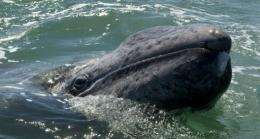Whales closer to us than thought, say scientists

As the future of whales once more comes under global debate, some scientists say the marine mammals are not only smarter than thought but also share several attributes once claimed as exclusively human.
Self-awareness, suffering and a social culture along with high mental abilities are a hallmark of cetaceans, an order grouping more than 80 whales, dolphins and porpoises, say marine biologists.
If so, the notion that whales are intelligent and sentient beings threatens to demolish, like an explosive harpoon, the assumption that they are simply an animal commodity to be harvested from the sea.
That belief lies at the heart of talks unfolding at the International Whaling Commission (IWC), meeting from Monday to Friday in Agadir, Morocco.
A fiercely-contested proposal would authorise whale hunts by Japan, Norway and Iceland for 10 more years, ending a 24-year spell in which these nations -- tarred as outlaws by a well-organised green campaign -- have snubbed or sidelined the IWC's moratorium on whaling.
"We now know from field studies that a lot of the large whales exhibit some of the most complex behaviour in the animal kingdom," said Lori Marino, a neurobiologist at Emory University in Atlanta, Georgia.
A decade ago, Marino conducted an experiment with bottlenose dolphins in which she placed a small mark on their body and had the mammals look at themselves in a mirror.
By the way the dolphins reacted to the image and then looked at the spot, it was clear that they had a sense of self-identity, Marino determined.
For Georges Chapouthier, a neurobiologist and director of the Emotion Centre at Pierre and Marie Curie University in Paris, self-awareness means that dolphin and whales, along with some higher primates, can experience not just pain but also suffering.
Unlike nociception -- a basic nerve response to harmful stimuli found in all animals -- or lower-order pain, "suffering supposes a certain level of cognitive functioning," he said in an interview.
"It is difficult to define what that level is, but there's a lot of data now to suggest some higher mammals have it, including great apes, dolphins and, most likely, whales."
As for intelligence, cetaceans are second only to humans in brain size, once body weight is taken into account.
More telling than volume, though, are cerebral areas which specialise in cognition and emotional processing -- and the likelihood that this evolution was partly driven by social interaction, according to several peer-reviewed studies.
Some scientists suggest this interaction can best described as culture, a notion usually reserved for homo sapiens.
"Evidence is growing that for at least some cetacean species, culture is both sophisticated and important," said Hal Whitehead, a professor at Dalhousie University in Halifax, in the Canadian province of Nova Scotia.
If culture is learned behaviour passed on across generations that is different from one community to the next, then humpback whales, to cite one example, are rather cultured indeed.
"At any time during the winter breeding season, all the males in any ocean sing more or less the same elaborate song, but this communal song evolves over months and years," Whitehead and colleagues noted in a study in the journal Biological Conservation.
Scientists have also observed orcas, or killer whales, learning from other orcas from a geographically separate group how to steal fish from so-called longlines used by commercial fishing boats.
Two orca communities that rarely intermingle despite sharing the same waters off the coast of Vancouver Island, meanwhile, have learned to divide their natural bounty: and one group eats fish and the other mammals, especially seals, Whitehead reported.
Such findings are disturbing factors in the calculus of conservation.
"If we wipe out a sub-group, it is more than killing a certain number of individuals. It could actually wipe out an entire culture," Marino said.
At a meeting of the American Association for the Advancement of Science (AAAS) in February, scientists concluded that new data on cognition and culture among whales should be the guideline for international wildlife policy.
To date that hasn't happened in any international forum, including the IWC, said Margi Prideaux, head of cetacean conservation at the Whale and Dolphin Conservation Society.
"Aside from a narrow focus on killing methods -- what type of harpoon grenade, for example, is most humane -- ethics or the status of whales as sentient beings do not figure in talks at the IWC," she said.
(c) 2010 AFP


















